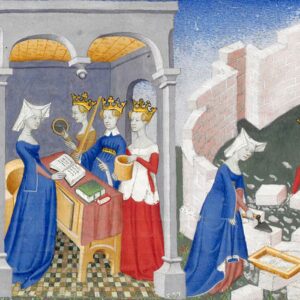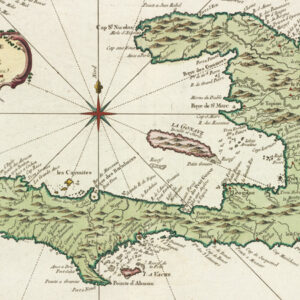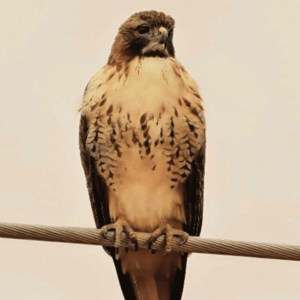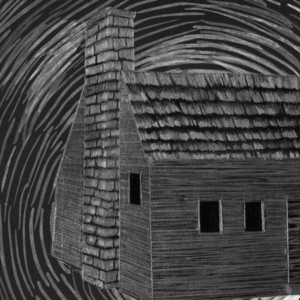
Diana Abu-Jaber: “Among the Bedouins, a Knife is Never Just a Knife.”
On Nourishment, Betrayal, and Finding Family Histories
It was a familiar homily at our dinner table—the tale of the chicken. Filling our plates, Dad recalled how his mother would place a dish of roasted chicken at the center of the table and watch her nine children fall upon it.
Sometimes the story went that the platter was passed in an orderly fashion, from the eldest at the head, down through the middles, ending with my father and the youngest siblings at the bottom. Other times he described it as a free for all, voices raised, forks and elbows flying.
In either case, Dad generally ended up with a plateful of what he described as “bones and air.” But then as he told the story, his eyes would turn narrow and crafty, and he would begin to talk about the secret chicken. Snapping the chicken bones in his hands, he showed my sisters and me the scant but tasty marrow hidden inside. He turned the chicken over and cut out the tender pieces in the back. And he showed us the prize—the meaty, succulent tail. To many Americans, such bits get tossed away carelessly. But to Dad, these morsels had sustained him; me and my siblings needed to be ready for our own journeys.
That’s the thing about immigration—you don’t stop traveling. It might begin with the thrill of adventure and discovery, but there’s also ambivalence and loss—of family, home, and country. Many don’t realize that the long and perilous journey doesn’t end when you arrive. In many ways that’s just the start. As a young father, Dad was already starting to realize this. It didn’t matter if his children remained in the land where they were born: they too were going to need signposts and secret cues to guide us on our way. With his stories he gave us the answers to riddles: turn the chicken over, crack its bones open. Tell no one.
But some of this training was more subtle. Dad loved to discourse on the importance of family, its unbreakable bonds. But he was also telling another sort of story at the same time—one that I didn’t fully grasp at the time. I was the eldest and I knew that siblings could be aggravating. But on a deeper level, they were sacred. I couldn’t imagine snatching the food from my sister’s mouth. Dad’s stories walked a line—extolling the fun and affection of his oversized family; then, casually mentioning the knife fight between himself and a younger brother; or the time his father shot at him for sneaking out to a party, or the time another brother gave away Dad’s much-loved dog. Watch your backs, he whispered, this world is treacherous and it’s hard to know who to trust.
Originally, my grandfather Saleh owned three knives. They had come from my father’s father—who’d inherited them from his own father. I didn’t know exactly how many generations back they extended—but it was enough to have spiraled into history. Though my father’s family now lived in the city, if you looked over their shoulders, you’d see a long line of sheikhs, poets, and Bedouins. Each generation had their trusted tools, secret paths, and shared stories.
One of my jiddo’s knives was long, polished silver, studded with precious stones. But after Saleh’s death, a village warlord visited my widowed grandmother to pay his respects and to request a keepsake.
I’m not sure why she gave it away. Perhaps my grandmother felt bound to codes of propriety and hospitality. Likely there were unpaid debts. According to Dad, my grandfather was renowned for his ability to enjoy himself. There were many stories involving araq—the potent favorite among Jordanian Bedouins. According to family lore, Jiddo once invited an entire garrison of the British army over for dinner, and they obliged, dressed in full regalia—much to my grandmother’s dismay. Whatever the reason, the beautiful, ceremonial knife was given away, leaving two behind.
In both real life and the novel, the story of the knife was the story of obsession without reason, the tearing apart of a family in the envious, furious search for family—its spirit or essence.
Knives have a deep and enduring history in the Middle East. Exquisite Egyptian swords and sickles survive from the Bronze Age, and it is still possible to view some of the knives and swords from the prophet Mohamed’s personal collection. Bedouins are reputed to carry at least one knife on their person at all times, and this was true for my grandfather as well.
All cultures have their objects of power and desire: from small personal keepsakes to the holy grail to Excalibur. Hitchcock even had a name for it in filmmaking—the Maguffin. The Maguffin is the thing that sets the plot in motion, like the Maltese Falcon—the item that everyone chases, and which may or may not have much value of its own. Among the Bedouins, a knife is never just a knife. It’s country, home, and lineage. Worn against the skin, it becomes part of the wearer’s DNA, part of their deepest identity.
After his siblings went on to marriage, careers, school, and travel, Dad remained behind to care for his father during his final illness—a brutal task. In gratitude, Jiddo bequeathed his knives to my father. This legacy worked its way into my novel, Fencing with the King. In it, the protagonist’s brother is haunted by the idea that he has been in some way cheated by their father. In real life, something very similar happened to my father. Perhaps this is inevitable in such a big family—someone always feels cheated because there’s never much to go around. This family member, like the character in my book, became obsessed with the knives.
Not long after the death of my jiddo, while my father was out one day, he returned to discover that one of the knives was missing from his room. it was clear that someone had ransacked the place and stolen the large, elegant knife. Dad had felt afraid something like this might happen: he’d taken care to wear the smallest knife as their father had, strapped to his midsection, hidden under his clothes.
The knife Dad kept was worn and humble. To my father the last knife was the most precious of all because it was the daily knife, the one closest to memory. Apparently, this also became clear to the jealous family member. No longer satisfied with the first theft, this person soon began hounding my father, demanding the last knife. This pursuit went on for years, even after Dad moved to the United States, there were calls, telegrams, letters, and visits. It was such a drawn out, monomaniacal campaign that I couldn’t even convey it in a way that would seem believable in the novel. I ended up cutting large swathes of the story, editing it down to better fit the larger framework of the tale.
In both real life and the novel, the story of the knife was the story of obsession without reason, the tearing apart of a family in the envious, furious search for family—its spirit or essence. This relative was educated, accomplished, celebrated, and far wealthier than my father. Yet somehow none of this was enough. I didn’t understand this until I brought it into my novel. As I wrote about this character, I began to grasp the motivations of the actual person—this was an obsession born of deeper insufficiency. In life, as in my novel, the younger son was the favored one. Dad was neither rich or famous, but he had sweetness and an authentic love of the world. This genuine quality couldn’t be learned or purchased.
I’d heard the story of the knife many times—how Dad acquired it and managed to hang on to it, but I’d never actually seen the object myself, until one day not long after my fourteenth birthday, Dad abruptly put down his newspaper and said, “Stay there.” He brought it downstairs wrapped in a piece of velvet cloth. To be honest, I found the knife a little underwhelming—small and unembellished, with a dull pewter sheath and plain handle. Such is the case with so many items, their beauty or price tag is far outstripped by their symbolic worth. I politely admired it and then Dad put it away.
I love the knife for its protection spell—the way it reminds me of Dad’s stories about the treachery of the world and of my own great good luck in having siblings and family that I both love and trust implicitly.
For years, the phone calls and letters continued between my father and his relative back in Jordan. This person inquired about our health, offered news of the family, and inevitably requested or demanded the knife. This person and their family visited us as well—year after year—returning to the United States, staying at our house, eating dinner with us. We all loved and admired this relation—in truth, they seemed to have everything. But always, Dad said, at some point, his relative would take him aside and ask about the knife.
“What did you say, Dad?” I asked as an adult, years later, incredulous that this had all gone on, quietly, just under our noses.
“That I forgot where it was. Or that I didn’t have it, that I’d lost it. Or that someone else had it.” He laughed. “I couldn’t keep all my stories straight.”
“But why didn’t you tell us?” I asked. “And why did you let them keep visiting and harassing you like that?”
“Because they’re family,” he said, as if the answer should have been obvious.
I didn’t see the knife again until about ten years ago, after my father died. He didn’t leave much behind—just a few small items—and the knife. Mom brought it out, still wrapped in velvet, and said he’d wanted me to have it. My eyes filled. The knife had outlived several generations of owners and thieves, and I’d become the guardian of that legacy. I knew I’d have to write about it someday.
A few years after Dad died, his relative also passed away. I’d thought perhaps they might try to hunt the knife down through me, but now I suspect that the fight had lost its electricity once their adversary had gone. What no one could have predicted was that the knife was almost beside the point.
Not for me though. My interest in knives is essentially academic, but this one is different. It is among my most precious possessions. I love the knife for its protection spell—the way it reminds me of Dad’s stories about the treachery of the world and of my own great good luck in having siblings and family that I both love and trust implicitly. I keep it, because like my father, I believe it retains traces of its previous owners—reminding me of the long family line running backward and forward in time, informing my most essential identity. I keep it because we need anchors and totems to hold us in place, secret pathways and instructions to navigate the journeys and riddles of our own lives. We need to know where the extra meat is hidden, how to conjure the necessary charms, where to hide the treasured artifacts.
The knife hums from my father’s grip and that of his father before him. It is a stationary point in the world’s movements—a name, a home, a bloodline—it’s a little information in a land of too much and not enough. It’s part of the name of a family.
__________________________________
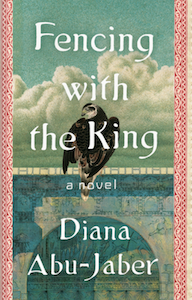
Diana Abu-Jaber’s book Fencing With the King is forthcoming in March from W.W. Norton.
Diana Abu-Jaber
Diana Abu-Jaber is the award-winning author of four novels, including Crescent, and a previous memoir, The Language of Baklava. She and her family divide time between Miami, Florida, and Portland, Oregon. Her new book, Life Without a Recipe is out now from W. W. Norton.









